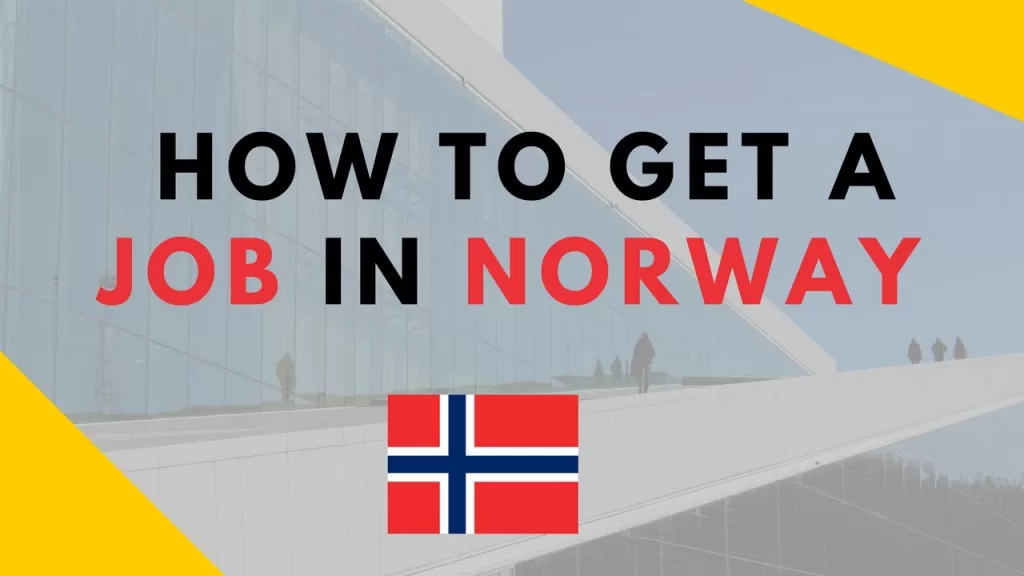How to Secure a Job in Norway from Nigeria (2026)
Are you a Nigerian citizen looking for job opportunities abroad? Norway, with its thriving economy and high standard of living, presents a promising destination for individuals seeking employment. This article will explore the job prospects, requirements, and the steps Nigerian citizens can take to find work in Norway.

To get a job in Norway as a Nigerian, you need to follow specific procedures and obtain the necessary documents. Norway is a country with a high standard of living and a strong economy, making it a desirable destination for job seekers. However, the process of securing a job in Norway can be challenging, especially for foreigners.
To begin with, you need to obtain a residence permit to work in Norway. This permit is issued by the Norwegian Directorate of Immigration (UDI) and is mandatory for all non-EU citizens who wish to work in Norway. You will also need to have a valid international passport and passport photographs. Once you have these documents, you can begin your job search in Norway.
One of the best ways to find work in Norway is by looking for positions through job websites like Monster or Indeed. However, this approach doesn’t guarantee results. Only about 43% of job seekers and applicants would find a position within three months using this method compared with 58% using recruiters or headhunters. Therefore, it’s advisable to seek the services of a recruiter or headhunter to increase your chances of finding a job in Norway.
KNOWING THE NORWEGIAN LABOUR MARKET
If you are looking to get a job in Norway from Nigeria, it is important to understand how the Norwegian labour market operates. Norway is known for its high standard of living, and its labour market is no exception. Here are a few things you should know about the Norwegian labour market:
- High demand for skilled workers: Norway has a shortage of skilled workers in many industries, including healthcare, IT, engineering, and construction. If you have skills and experience in any of these areas, you may have a better chance of finding a job in Norway.
- Strong focus on equality: Norway is known for its strong focus on equality, and this extends to the workplace. Employers are required to provide equal pay and equal opportunities to all employees, regardless of gender, ethnicity, or other factors.
- Flexible working hours: In Norway, flexible working hours are common. Many employers offer flexible schedules or the option to work from home. This can be especially beneficial if you have family or other commitments.
- Good work-life balance: Norway is known for its good work-life balance. The average work week is 37.5 hours, and employees are entitled to five weeks of paid vacation per year. In addition, Norway has generous parental leave policies.
- Strong social safety net: Norway has a strong social safety net, which includes universal healthcare, free education, and generous unemployment benefits. This can provide peace of mind if you are worried about job security.
Have it in mind that the Norwegian labour market is competitive but offers many benefits to employees. If you have skills and experience in a high-demand industry, and are willing to adapt to Norwegian work culture, you may be able to find a rewarding career in Norway.
WORK PERMIT REQUIREMENTS FOR NIGERIAN CITIZENS
If you are a Nigerian citizen looking to work in Norway, you will need to obtain a work permit. The processing time for a work permit application can vary depending on your situation. It can take anywhere from a few weeks to several months to receive a decision on your application. Here are the requirements you must meet to be eligible for a work permit:
ELIGIBILITY
To be eligible for a work permit in Norway, you must meet the following requirements:
- You must have a job offer from a Norwegian employer.
- The job offer must be for a skilled position that requires a high level of education or experience.
- You must have the necessary qualifications and experience to perform the job.
- You must be able to support yourself financially while in Norway.
APPLICATION PROCESS
To apply for a work permit, you must follow these steps:
- Choose the right type of residence permit that allows you to work in Norway.
- Register your application via the application portal and book an appointment with the police or embassy.
- Attend the police office or embassy in person.
- Submit the required documents, including your passport, job offer letter, and proof of financial support.
REQUIRED DOCUMENTS
When applying for a work permit, you will need to provide the following documents:
- A valid passport.
- A job offer letter from a Norwegian employer.
- Proof of financial support, such as bank statements or a letter from a sponsor.
- Proof of qualifications and experience required for the job.
IN-DEMAND INDUSTRIES AND JOB OPPORTUNITIES IN NORWAY
If you’re looking for job opportunities in Norway, it’s important to know which industries are in high demand. Here are some of the top industries and job opportunities in Norway:
HEALTHCARE
Norway’s healthcare system is in need of qualified professionals, including doctors, nurses, and caregivers. If you have experience in healthcare, there are many job opportunities available in Norway.
ENGINEERING
Mechanical, civil, and electrical engineering are all in high demand in Norway. If you have experience in any of these fields, you may be able to find a job in Norway.
INFORMATION TECHNOLOGY
Norway’s technology industry is growing rapidly, and there is a high demand for skilled IT professionals. If you have experience in software development, data analysis, or cybersecurity, you may be able to get a job in Norway.
EDUCATION
Norway has a strong education system, and there is a need for qualified teachers and professors. If you have experience in education, you may be able to find a job in Norway.
HOSPITALITY
Norway’s tourism industry is growing, and there is a need for professionals in the hospitality industry, including hotel and restaurant managers, chefs, and servers.
LEGAL
Norway’s legal system is in need of qualified professionals, including lawyers and judges. If you have experience in law, you may be able to find a job in Norway.
BIOTECHNOLOGY
Norway has a growing biotechnology industry, and there is a need for qualified professionals in this field. If you have experience in biotechnology, you may be able to find a job in Norway.
HOW TO SEARCH FOR JOBS IN NORWAY
If you are looking for a job in Norway, the first step is to search for job vacancies. Here are some tips on how to search for jobs in Norway:
- Use the NAV job database: The NAV job database, also known as Arbeidsplassen, is the main job portal in Norway. Most of the job vacancies are written in Norwegian, but you can find a number of job vacancies in English by using the pre-defined search. You can also register your CV and record permanent job searches on the website.
- Check other job portals: There are other job portals in Norway where you can find job vacancies. Some of the popular job portals include Finn.no, Jobbnorge.no, and Indeed.no. These websites also have job vacancies in English.
- Use social media: Social media platforms like LinkedIn and Facebook can be useful in finding job vacancies in Norway. You can join groups related to your field of work and look out for job postings. You can also connect with recruiters and hiring managers on these platforms.
- Contact recruitment agencies: There are several recruitment agencies in Norway that can help you find a job. These agencies have connections with employers and can help you find a job that matches your skills and experience.
- Network: Networking is important in Norway. Attend job fairs and events related to your field of work. You can also reach out to people in your industry and ask for job leads.
When searching for jobs in Norway, it is important to have a good, complete CV. Make sure your CV is tailored to the job you are applying for and highlight your relevant skills and experience. Also, be prepared to write a cover letter in Norwegian or English. Keep in mind that the job market in Norway is competitive, and it may take some time to find a job. Be persistent and keep applying to job vacancies that match your skills and experience.
HOW TO PREPARE FOR THE JOB APPLICATION PROCESS
If you are looking to get a job in Norway from Nigeria, it is essential to prepare yourself for the job application process. Here are some tips to help you get started:
1. RESEARCH THE JOB MARKET
Before applying for any job, it is important to research the job market in Norway. You should find out which industries are booming and what skills are in demand. This will help you tailor your job search and increase your chances of landing a job.
2. UPDATE YOUR CV AND COVER LETTER
Your CV and cover letter are your first impression to potential employers, so it is important to make them stand out. Make sure to highlight your relevant skills and experience and tailor them to the job you are applying for. You should also ensure that your CV and cover letter are free from errors and easy to read.
3. PREPARE FOR INTERVIEWS
If you are invited to an interview, it is important to prepare thoroughly. Research the company and the role you are interviewing for, and practice answering common interview questions. You should also dress appropriately and arrive on time.
4. UNDERSTAND THE VISA REQUIREMENTS
To work in Norway, you will need a work permit and a residence permit. You should research the visa requirements and ensure that you have all the necessary documents, including proof of employment and academic qualifications.
5. NETWORK
Networking is an important part of the job search process in Norway. You should attend industry events and job fairs, and connect with professionals on LinkedIn. This can help you learn about job opportunities and get your foot in the door.
BENEFITS AND CHALLENGES OF WORKING IN NORWAY
Working in Norway can be a great opportunity for Nigerians looking to gain international work experience and earn a higher income. However, there are both benefits and challenges to consider before making the move.
BENEFITS
- High salaries: Norway has one of the highest average salaries in the world, which can make it an attractive destination for job seekers. Additionally, the country has a high standard of living, so the cost of living is generally higher, but the higher salaries can offset this.
- Good work-life balance: Norway is known for its emphasis on work-life balance, with a maximum of 37.5 hours per week and generous vacation time. This can be a great benefit for those looking for a better work-life balance.
- Strong social welfare system: Norway has a strong social welfare system that provides benefits such as healthcare, education, and retirement benefits to all residents. This can provide a sense of security and stability for workers and their families.
- Multicultural society: Norway is a multicultural society that values diversity and inclusion. This can make it easier for foreigners to integrate and feel welcome in the country.
CHALLENGES
- High cost of living: While salaries in Norway are high, the cost of living is also high, especially in major cities like Oslo. This can make it difficult to save money or afford certain luxuries.
- Language barrier: While many Norwegians speak English, the official language is Norwegian, and many jobs require fluency in Norwegian. This can make it difficult for non-Norwegian speakers to find work.
- Nationalistic hiring practices: Norwegians tend to prefer hiring other Norwegians, which can make it difficult for foreigners to find work. Additionally, many jobs require a high level of education and experience, which can make it difficult for those without a strong background to find work.
- Cold climate: Norway has a cold climate, especially in the winter months, which can be a challenge for those not used to it.
COST OF LIVING AND SALARY EXPECTATIONS
If you’re considering moving to Norway from Nigeria, it’s important to have an idea of the cost of living and salary expectations. Norway is known for its high standard of living, but this comes at a cost. Here’s what you need to know:
COST OF LIVING
Norway is one of the most expensive countries to live in, so it’s important to be prepared for the high cost of living. The cost of food, housing, and transportation is particularly high, so you’ll need to budget accordingly.
To give you an idea of the cost of living in Norway, here are some average prices:
- A meal at a mid-range restaurant: 200-300 NOK (£16-£24)
- A litre of milk: 18-20 NOK (£1.50-£1.60)
- A one-way ticket on public transport: 37 NOK (£3)
- Rent for a one-bedroom apartment in the city centre: 10,000-15,000 NOK (£800-£1,200)
It’s worth noting that salaries in Norway are generally high, so while the cost of living may be high, you should be able to afford it if you have a good job.
SALARY EXPECTATIONS
Salaries in Norway are generally high, but they vary depending on your job and industry. The average monthly salary in Norway is around 45,000 NOK (£3,600), but this can vary widely.
Here are some average monthly salaries by industry:
- IT: 55,000-60,000 NOK (£4,400-£4,800)
- Engineering: 50,000-55,000 NOK (£4,000-£4,400)
- Finance: 45,000-50,000 NOK (£3,600-£4,000)
- Healthcare: 40,000-45,000 NOK (£3,200-£3,600)
It’s worth noting that these salaries are before tax, which can be quite high in Norway. However, the high salaries and good benefits make up for this to some extent.
FREQUENTLY ASKED QUESTIONS (FAQS)
If you’re looking to get a job in Norway from Nigeria, you may have some questions about the process. Here are some frequently asked questions and their answers:
CAN I GET A JOB IN NORWAY FROM NIGERIA?
Yes, it is possible to get a job in Norway from Nigeria. However, it may require more effort and preparation than finding a job in Nigeria. You will need to have the right qualifications, skills, and experience that are in demand in Norway. Additionally, you will need to have a valid work permit and visa to legally work in Norway.
HOW DO I FIND JOB OPPORTUNITIES IN NORWAY?
There are several ways to find job opportunities in Norway, including:
- Searching online job portals such as Nav.no, Finn.no, and Indeed.no
- Networking with people in your industry or field
- Contacting recruitment agencies that specialize in placing international candidates in Norwegian companies
- Checking with Norwegian companies that have operations in Nigeria
DO I NEED TO SPEAK NORWEGIAN TO GET A JOB IN NORWAY?
It depends on the job and the company. Some jobs, especially those that involve interacting with customers or clients, may require fluency in Norwegian. However, many international companies and startups in Norway use English as their working language, and may not require Norwegian proficiency.
WHAT ARE THE REQUIREMENTS FOR A WORK PERMIT AND VISA?
To work in Norway, you will need a work permit and a visa. The requirements vary depending on your nationality, the type of job you have been offered, and your qualifications. Generally, you will need to have a job offer from a Norwegian employer, and meet certain educational and income requirements. You will also need to provide evidence of your language proficiency, health insurance, and financial support.
HOW LONG DOES IT TAKE TO GET A WORK PERMIT AND VISA?
The processing time for a work permit and visa can vary depending on your individual circumstances and the workload of the Norwegian embassy or consulate in Nigeria. Generally, it can take several weeks to several months to receive a decision on your application. It is advisable to apply well in advance of your intended start date to allow for any delays or complications.
WHAT IS THE COST OF LIVING IN NORWAY?
Norway is known for its high cost of living, especially in major cities like Oslo and Bergen. The cost of accommodation, food, and transportation can be significantly higher than in Nigeria. However, salaries in Norway are also generally higher than in Nigeria, and there are many benefits such as free healthcare and education.
CAN I BRING MY FAMILY WITH ME TO NORWAY?
If you are granted a work permit and visa, you may be able to bring your family with you to Norway. However, they will need to apply for their own visas and meet certain requirements. Additionally, you will need to have sufficient income and accommodation to support your family while living in Norway.


